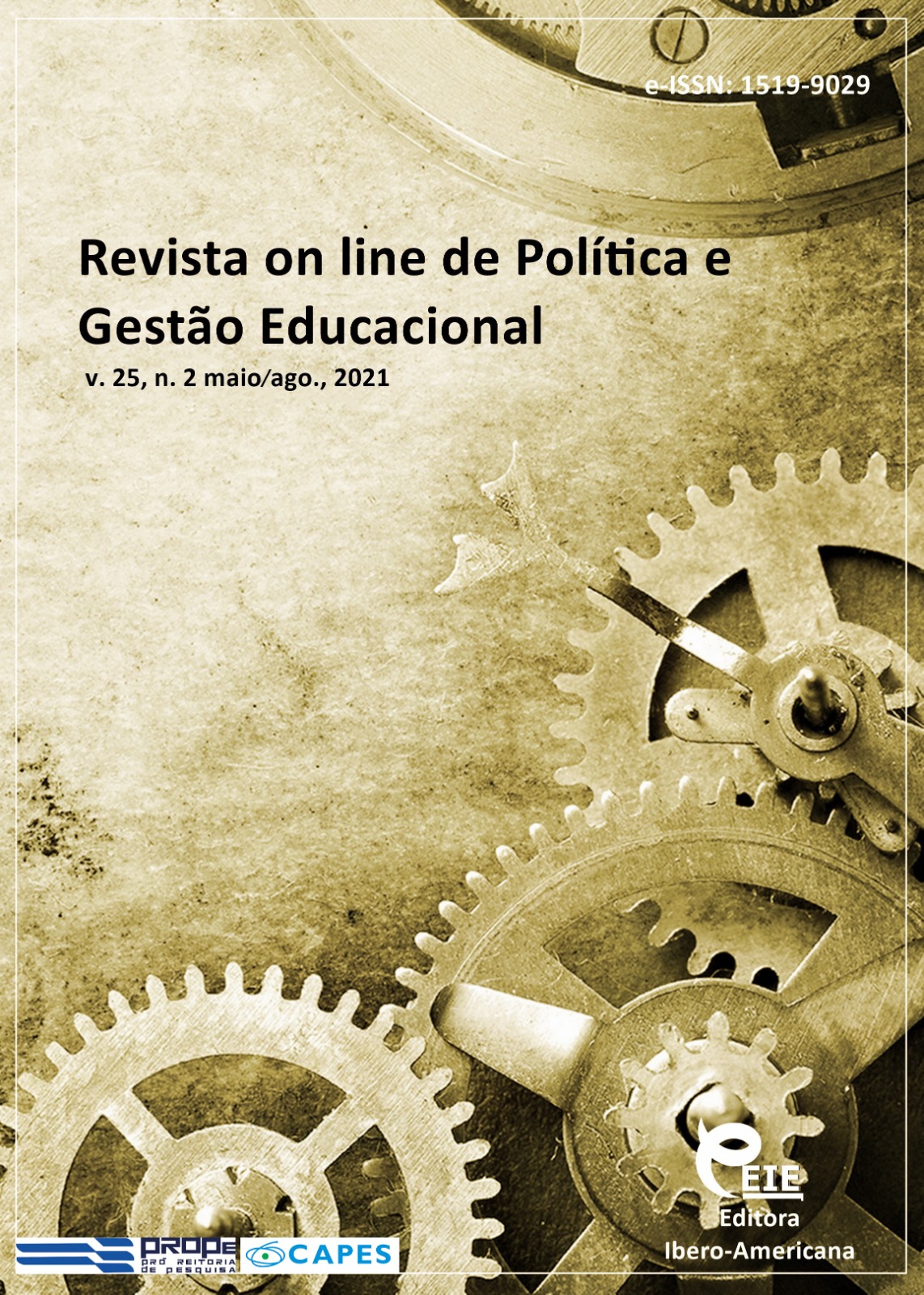La individualización en la formación de una personalidad antivictimista a través de la educación física y el deporte
DOI:
https://doi.org/10.22633/rpge.v25i2.15184Palabras clave:
Individualización, Educación de la personalidad, Personalidad antivíctima, Educación física, DeportesResumen
Este artículo aborda la cuestión de la individualización de la educación en el contexto del concepto de personalidad antivíctima. El aspecto menos desarrollado de la individualización de la educación es la cuestión del uso de la educación física y el deporte como herramientas en la educación de la personalidad antivíctima. El estudio utilizó entrevistas estructuradas junto con un análisis victimológico. El tratamiento estadístico del material se realizó mediante el criterio no paramétrico χ2 de Pearson. Se identificaron cuatro grupos de participantes en el estudio según su nivel de conciencia de la importancia del desarrollo físico. Sólo los deportistas "activos" tenían actitudes antivíctimas hacia las dificultades y los fracasos en la educación física y las actividades deportivas. Esto demuestra que una de las formas de formar una personalidad antivíctima en el deporte es superar conscientemente las dificultades y aumentar los niveles de autoestima.
Descargas
Citas
AGUIAR, V. C. F.; SOARES, S. L.; LEITÃO, H. V. Physical education and its health training process. Revista on line de Política e Gestão Educacional, Araraquara, v. 23, n. 2, p. 428-440, 2019. DOI: https://doi.org/10.22633/rpge.v23i2.12649
BOBROVA, O. M.; BOBROVA, E. V.; EREMENSKAYA, L. I. Increased mobility and functionality using general and professional applied physical training of university students. Science Prospects, Tambov, v. 2, n. 101, p. 93-97, 2018.
BUDYAKOVA, T. P. Characteristics of visual contacts in the process of taking hostages. Voprosy Psikhologii, Moscow, n. 3, p. 96-104, 2014.
BUDYAKOVA, T. P. The formation of anti-victim personality in the context of sports. Propósitos y Representaciones, Lima, v. 8, n. esp. 3, e703, Sep. 2020. DOI: http://dx.doi.org/10.20511/pyr2020.v8nSPE3.703
CHAN, V. et al. Making sense of individualized education programs and neuropsychiatric assessments: practical tools to support children and families in school and during transition to higher education. Journal of the American Academy of Child & Adolescent Psychiatry, v. 57, n. 10, Suppl., p. 330, Oct. 2018. DOI: https://doi.org/10.1016/j.jaac.2018.07.834
GAFFAR, V.; YUNIAWATI, Y.; RIDWANUDIN, O. A study of outdoor recreation motivation and activity preferences. Journal of Southwest Jiaotong University, Chengdu, v. 54, n. 3, June 2019. DOI: https://doi.org/10.35741/issn.0258-2724.54.3.23
HECKMAN, C. J.; CLAY, D. L. Hardiness, history of abuse and women's health. Journal of Health Psychology, v. 10, n. 6, p. 767-777, Dec. 2005. DOI: https://doi.org/10.1177/1359105305057312
IGE, O. A. What we do on social media! Social representations of schoolchildren's activities on electronic communication platforms. Heliyon, v. 6, n. 8, e04584, Aug. 2020. DOI: https://doi.org/10.1016/j.heliyon.2020.e04584
KLAPERSKI, S. et al. Does the level of physical exercise affect physiological and psychological responses to psychosocial stress in women? Psychology of Sport and Exercise, v. 14, n. 2, p. 266-274, Mar. 2013. DOI: https://doi.org/10.1016/j.psychsport.2012.11.003
KNAUDER, H.; KOSCHMIEDER, C. Individualized student support in primary school teaching: A review of influencing factors using the Theory of Planned Behavior (TPB). Teaching and Teacher Education, v. 77, p. 66-76, Jan. 2019. DOI: https://doi.org/10.1016/j.tate.2018.09.012
KOVALENKO, N. Problems faced by athletes in elite sports. Science in Olympic Sport, Kyiv, n. 1, p. 71-83, 2015.
KRATOCHVÍLOVÁ, J.; HAVEL, J. Application of individualization and differentiation in Czech primary schools - one of the characteristic features of inclusion. Procedia - Social and Behavioral Sciences, v. 93, p. 1521-1525, Oct. 2013. DOI: https://doi.org/10.1016/j.sbspro.2013.10.075
MEEHAN, A. J. et al. Developing an individualized risk calculator for psychopathology among young people victimized during childhood: a population-representative cohort study. Journal of Affective Disorders, v. 262, p. 90-98, Feb. 2020. DOI: https://doi.org/10.1016/j.jad.2019.10.034
POPKOVA, N. V. Individualization of the process of physical education of older preschool children based on taking into account the characteristics of the physique. Theory and Practice of Physical Culture, n. 5, p. 36-38, 2010.
SANDVIK, A. M. et al. Physical fitness and psychological hardiness as predictors of parasympathetic control in response to stress: a Norwegian police simulator training study. Journal of Police and Criminal Psychology, v. 35, n. 4, p. 504-517, Mar. 2019. DOI: https://doi.org/10.1007/s11896-019-09323-8
SAVITSKAYA, N. V. The main directions of social and pedagogical prevention of deviant behavior in children and adolescents. Social Relationships, Moscow, v. 2, n. 29, p. 83-90, 2019.
SHAW, R. J. et al. Do social support and eating family meals together play a role in promoting resilience to bullying and cyberbullying in Scottish schoolchildren? SSM - Population Health, v. 9, 100485, Dec. 2019. DOI: https://doi.org/10.1016/j.ssmph.2019.100485
SIMONOVA, I.; POULOVA, P. Plug-in reflecting student's characteristics of individualized learning. Procedia - Social and Behavioral Sciences, v. 171, p. 1235-1244, Jan. 2015. DOI: https://doi.org/10.1016/j.sbspro.2015.01.237
SINGH, S. P. et al. Relationship between participation in competitive wheelchair sports and the level of independence with activities of daily living: a pilot study. PM&R, v. 5, n. 9, p. 195-196, Sep. 2013. DOI: https://doi.org/10.1016/j.pmrj.2013.08.266
STOYANOV, D. et al. (Eds.). International perspectives in values-based mental health practice. Case studies and commentaries. Cham: Springer, 2021.
TAKAHASHI, K.; OZAWA, E.; HARIZUKA, S. Impact of corporal punishment on victims’ future violent behavior in extracurricular sports. Heliyon, v. 6, n. 9, e04903, Sep. 2020. DOI: https://doi.org/10.1016/j.heliyon.2020.e04903
TASHCHEVA, A. I. The first impressions of psychological problems in Beslan. Russian Psychological Journal, Rostov-on-Don, v. 2, n. 1, 83, Mar. 2005. DOI: https://doi.org/10.21702/rpj.2005.1.8
TEIXEIRA, F. C. F. et al. Experience report: reflections on the role of physical education professional in the field of multiple deficiencies. Revista on line de Política e Gestão Educacional, Araraquara, v. 22, n. 1, p. 453-464, Jan. 2018. DOI: https://doi.org/10.22633/rpge.v22.n.1.2018.10204
VOLOSACH, I. V.; TERTYCHNY, A. V. Differentiation and individualization of training in the system of physical education. Almanac of Modern Science and Education, Tambov, n. v. 4, n. 11, p. 54-57, 2008.
Publicado
Cómo citar
Número
Sección
Licencia
Derechos de autor 2021 Revista on line de Política e Gestão Educacional

Esta obra está bajo una licencia internacional Creative Commons Atribución-NoComercial-CompartirIgual 4.0.
Manuscritos aceitos e publicados são de propriedade da Revista on line de Política e Gestão Educacional. É vedada a submissão integral ou parcial do manuscrito a qualquer outro periódico. A responsabilidade do conteúdo dos artigos é exclusiva dos autores. É vedada a tradução para outro idioma sem a autorização escrita do Editor ouvida a Comissão Editorial Científica.











